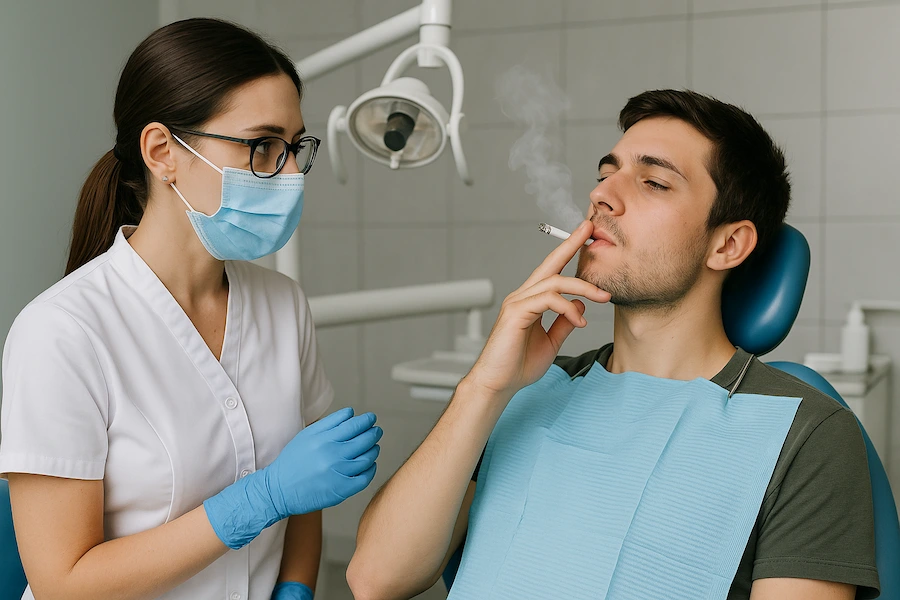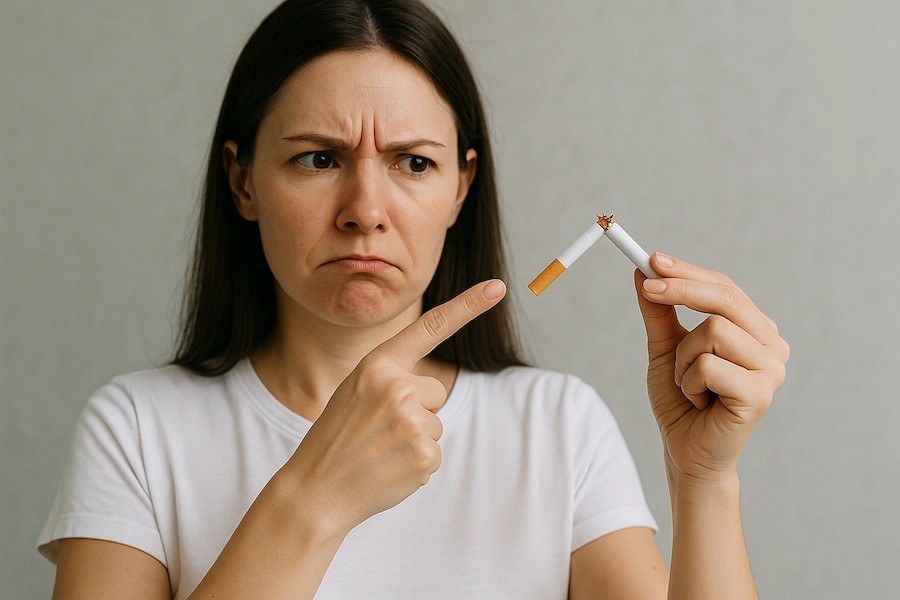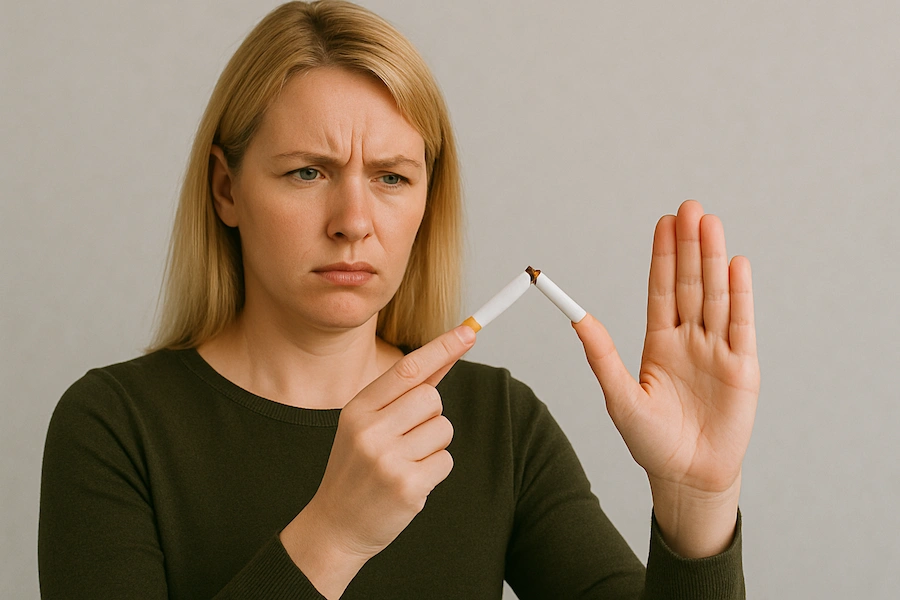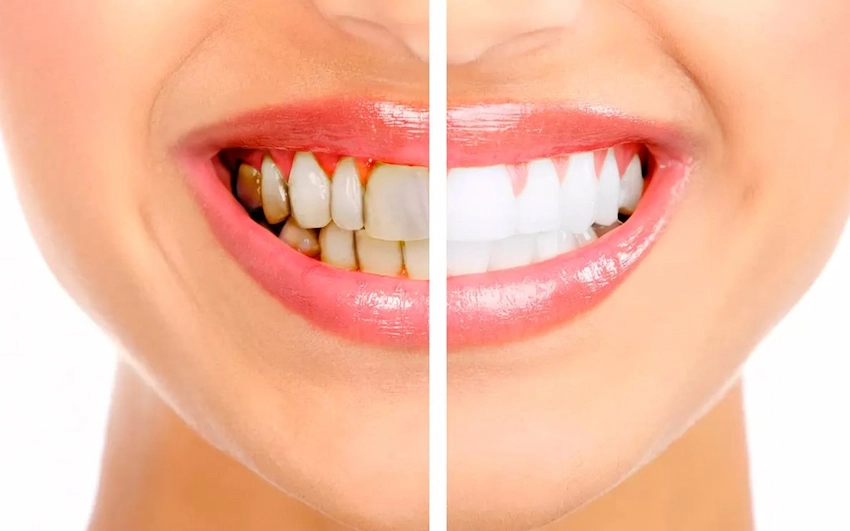🦷How Long After Wisdom Tooth Extraction Can I Smoke?

It is now well-established that smoking after the extraction of wisdom teeth can drastically influence the rate of recovery. It is very important to stay informed about the potential hazards and the most important methods that should be followed to promote a good recovery.
As a means of decreasing complications, one effective practice is to postpone resuming smoking for as long as possible, as that will improve overall recovery and healing. Taking care of your health is crucial, as this is the most precious thing in life.
Maturely Dealing with Wisdom Tooth Extraction and Healing
Wisdom tooth extraction is a documented frequently performed procedure meant to avert multiple future orthopedic issues. But once the procedure is done, actually, the body is on a healing journey. Learning about the extraction procedure and its demands on your body may greatly improve individual recoveries and promote better healing results.
Take Me Through the Process of Wisdom Tooth Extraction
During the wisdom tooth extraction procedure, the dentist administers a local anesthetic to the patient and forcibly removes the teeth from their sockets. In an instance like this, it could be bonded with gum tissues and also bones because the tooth is affected. After –the tooth has been removed, the dentist cleans the area and stitches it appropriately in order to avoid post-operative complications and guarantee proper recovery.
Consequently, it is pivotal to consider not to smoke within the first three days after extraction, as it could create a partial vacuum that can damage healing tissues and cause dry sockets. A dry socket is a complication that arises from the loss of a blood clot in the socket, exposing the bones and nerves underneath. This increases the chances of developing infections and can cause excessive pain and hence further delays the recovery.
What Am I to Expect After a Wisdom Tooth Extraction?
The recovery period after wisdom tooth removal usually lasts for weeks to months on the upper end. As for the first three days, you might notice some swelling and feel some discomfort. For instance, within the first week, the bulk of the saying and the pain should be gone and you will be able to resume normal activities.
After this week, another critical period is usually that of the next two to four weeks. At this stage, the soft tissues that cover the extraction site are generally healing up. However, you need to be careful about what you eat during this time and refrain from consuming hard foods such as nuts, popcorn and chips as they can hurt the delicate areas. Getting the complete healing of the bone and the general bones may take at least six months or even longer depending on the complexity of the extraction. Throughout this time, taking care of your mouth by regularly brushing your teeth, keeping hydrated and maintaining a healthy diet can speed up the post-operative recovery process.
Maintaining Oral Health After Wisdom Teeth Extraction
In addition to considering the above advice, it is vital to refrain from smoking after the operation, as this increases the likelihood of complications. Other bad effects of smoking include poor healing of the mouth and an increase in the risk of bad bacteria and infections.
The presence of any other ailments like diabetes or problems with blood circulation will also be important since they mean there will most likely be complications during your postoperative periodIf you lead unhealthy lifestyle habits like smoking or consumption of junk foods, those may prolong the recovery period. It might be useful for patients to change their style of life.
Why Is Smoking After Wisdom Tooth Extraction Risky?
After taking out molars yes yes it is risky because inflammation happens when clipping off smaller edges of dental bones so inflammatory substances both from inside the body coming out or outside through any physical sources will increase if they occur together smoking tobacco with above mentioned diseases.
Why Is Smoking After Wisdom Tooth Extraction Risky?
The risks posed by smoking after wisdom tooth extraction and how understanding them will help you make informed decisions regarding your recovery and rehabilitation. Maybe it is also a good idea to provide some meaning to the text while thinking about whether doing one would heal?
How Smoking Affects Blood Clot Formation
In fact, at least one of these chemicals- nicotine has already been mentioned above as being totally bad news since it interferes with this necessary operation strongly showing up in every article compared here together.
Upon having a tooth extracted it is essential that within minutes after treatment healthy regional bleeding occurs leading to formation of new clots which are believed by many authors among other benefits provide consumers not only comfort but also good feeling generally add positively to all remarkable processes.
Moreover without normal levels of sufficient clotting wounds remain open allowing more foreign agents attacking soft tissues. And not surprisingly the tissue gets cut and usually the healing period takes longer than expected.
Increased Risk of Dry Socket and Infection
Smoking greatly increases the inherent risks associated with dry sockets or infections after an extraction of wisdom teeth since the constant process of puffing in smoke creates unnecessary pressure within the mouth that causes these crucial blood clots required for healing.
These blood clots might get dislodged while smoking resulting in intolerable pain and a high probability of contaminating the open wound through bacteria during this delicate healing process hence resulting in infections.
These objections must be considered seriously if you don’t want to go through the painful experience of a dry socket. If affected you may at the time of any positive terms probable loss these other problems present as well as undesirable effects upon your physical health.
Slower Healing Due to Reduced Blood Flow
Another danger that comes from habitually smoking tobacco is the reduced immobility to attractions and prevalence rate for it to constrict blood vessels thus limiting circulation of blood into areas of concern like those found in the gum’s areas surrounding any teeth which have been worked upon during surgeries performed on them by dentists.
Less blood flow means less oxygen getting delivered into wounds which further hampers healing due to malnutrition because they are struggling too much not possessing favorable conditions needed to attain full recovery time from accidents reconstruction procedure or tooth extractions – this will bring along with longer periods within which a person in undertaking treatment processes can become more serious than ever before considering possible resulting things such as unbearable tenderness tenderness swelling around an injured body part getting infected exposed to the external environment.
Impact of Nicotine and Chemicals on Gum Tissue
The effects among nicotine as well as other harmful substances found inside cigarettes further compound the situation if people still smoke any tobacco products nevertheless even though the same already experience risks of developing oral cavity illnesses or infections. These chemicals negatively affect gums.
These are capable of making an aged badly piece of tissue take a long time to heal and might even irreversibly damage some part kept in an appropriate state before. Hence, if you wish for your gums to heal properly and efficiently while respecting the risks that come from smoking and nicotine, totally avoid them during this period of recovery. It is important, guys, because in the case of your health this is the case when it is necessary to do everything to prepare thoroughly for the operation by quitting smoking.
Recommended Waiting Time Before Smoking
The recommended time to wait before smoking after having wisdom teeth pulled is at least 72 hours. This advice is issued however; waiting times would even be a bit more prone to provide some implication improvements during the recovery phase. This period is simply vital because it is that time which allows the formation of blood clots that protect the sensitive areas of your jaws and goes further lowering down the odds of the appearance of dry sockets or voices. At the same time, if you can avoid smoking altogether for a week, it would be a great bonus for your body and a great chance for healing without any hassle.
How Long Should You AvoidIndeed, it is recommended that you refrain from smoking tobacco for a duration of not less than seven days following a wisdom tooth removal procedure for maximum healing. Achieving this is essential for the best outcomes and reducing the chances of dry socket healing complications. Following the suggestions outlined by the dental surgeon of the general dentist for quitting smoking or at least reducing its usage offers great assistance when it comes to healing and general health after oral surgery.
Variances in Recovery Duration between Routine and Surgical Extractions
The time frame needed for complete recovery varies significantly among regular extractions compared to surgery requiring surgery done on your teeth. After standard procedures requiring tooth extraction, by third and fourth days one feels better because such procedures do not incur any considerable invasiveness.
However, a significantly more invasive tooth removal operation entails surgical intervention that takes over several days or even weeks before one completely recovers due to the amount of trauma endured. With good comprehension regarding these critical variations in healing time managed through your body, healing will be easier.
Could Smoking Too-Soon Be Harmful?

Any tendency towards igniting a cigarette too early after undergoing any form of extraction and surgery can potentially remove blood clots that have already formed on sensitive parts leading yet again to a problem known as dry socket syndrome.
Furthermore, engaging in visible cigarette smoking at this early stage might induce infectious microorganisms and slow down the total healing duration. Hence receiving relevant knowledge regarding possible dangers of premature smoking after oral procedures increases the chances of safe healing.
Handling the Situation with Care When You Want a Smoky Break
In cases where people find it unavoidable to light up during recovery, they may adopt several tactics for a minimum risk approach. Such techniques may be dependent on grounded considerations and would thus not lead to any significant complications even for less severe oral surgeries.
Try not placing a cigarette anywhere near the extraction site, remain away from inhaling the smoke directly and do not suck in or compress the cheeks frequently surrounding the area, or cup the areas surrounding the site.
Again, I, who are the health of the individual, prioritize all such and look to reduce the smoking and thus improve the healing and well-being. Consider that even people who take in cigarettes have their own advantages for their convalescence processes, however, for the overall health indicators mean avoiding the negative impact of smoking not only after oral surgeries. Consult your dentist or oral surgeon if quitting is not a clear option, current interest is in a more gradual approach, or need assistance in any regard wherein personal will to change is apparent.
Using Gauze to Protect the Extraction Site
In case you have the strong urge to smoke right after a wisdom tooth extraction or any other dental operation, one way that you can help safeguard the extraction zone is by applying a clean piece of gauze before smoking.
The use of gauze can assist in absorbing some harmful effects and protecting the area as much as possible. Gauze not only acts as a barrier but also helps to keep the blood clot firmly in place by covering it up with a second layer of support. This is important since clots are responsible for promoting the healing process hence gauze can go a long way towards ensuring that they remain increased thus facilitating effective recovery.
Rinsing Your Mouth After Smoking
Rinsing your mouth after smoking can have a remarkably effective way of assisting in counteracting some effects of the act. This is for example done by utilizing home products such as saltwater or antiseptic solutions to clean the mouth.
Their cleaning action helps eliminate wastes and prevent the bacteria that are present in the oral cavity from sexually transmitted diseases. This practice gets rid of toxic matters, thereby promoting healing and lowering the chances of developing tension related to smoking, for instance, infections or dry socket.
Switching to Nicotine Patches or Alternatives
Another approach to consider after wisdom tooth removal is switching to nicotine patches or other alternatives for inhibiting the habit. These options provide for the body’s need for nicotine without exposing the user to the harmful tar and toxins resulting from gum smoking.
Nicotine patches gradually diffuse nicotine into the bloodstream, thereby preventing any sudden spikes or dips in its levels that can otherwise trigger cravings. If you are desperate about doing away with the habit, consult with your doctor on which products to use during your recuperation because of their safety and effectiveness.
Staying Hydrated to Reduce Dryness and Irritation
After going through water extraction, it is particularly important to drink sufficient water in order to let recovery ensue naturally. Water has a direct effect on keeping your mouth moist thus mitigating any opportunities of residues thus lessening irritations.
Proper nourishment supplied by normal fluid intake does not only enhance capability in fighting negative incidences but also makes mobile parts move and clean effectively with no fixed spaces or accumulation of dirt in between. By sticking to the intake of proper fluids, you considerably impact positively upon the quality and speedily of your recovery period, which is paramount to the duration of the regimen and avoiding some probable ailments.
How to Promote Faster Healing After Wisdom Tooth Extraction
To summarize, caring for yourself after wisdom tooth extraction (although it can be hard) is essential for subsequent administration thus making use of some careful habits. Gauze is useful not only for providing a protective surface
After having your wisdom tooth extracted, promoting faster healing consists of a number of different practices. When you eat the right foods, keep your mouth clean, and avoid risky habits, you will be enhancing the process of healing your teeth and coming back to normal life as fast as possible. Adopting the above-mentioned strategies and tips is imperative for you to ensure proper recovery and avoid any complications.
Foods that Speed up Recovery after Wisdom Teeth Extraction
It is very important to eat foods that are soft and contain the right nutrients to help the healing of your body after tooth extraction. Some of the best types of food to eat include yogurt, applesauce, scrambled eggs, pureed vegetables, and other nutrients like these that are low in fiber and are also easy to swallow.Eating these soft forms of food will help you not only to load your body with important nutrients but also will not stress your gauze-covered extraction site unnecessarily.
Dental Hygiene Tips for Wisdom Tooth Recovery
After undergoing wisdom tooth removal, it is important to observe proper oral hygiene to be able to recover quickly. Even though it is crucial to perform proper brushing of the teeth, the removal area should not be brushed during the first 2 days after the fixing. To keep the susceptible area safe from bacteria, rinse your mouth with warm salt water at least 4 times a day for the first 2 to 3 days after surgery. Infections which delay proper healing of the body and powerful adherence to the oral cleaning practices will not be caused.
Other Complications to Avoid for Effective Healing
For your wisdom tooth removal healing process to be successful, you should also avoid some activities and bad habits that result in prolonged healing. Alcohol-fueled activities like drinking too much alcohol and chewing tobacco also disrespects and irritates the healing process of your mouth. Therefore, for the purpose of comfort and convenience, it is advisable to refrain from these unhealthy habits to enable your body to heal as quickly as possible.
Warning Signs of Complications from Early Smoking
Once your wisdom tooth is removed, you should be careful to note the signs that indicate complications. Being familiar with such symptoms can enable you to call for help and get appropriate medical attention as soon as possible. Pay attention to your progress as you heal and if you discover anything unusual about your mouth, such as prolonged bleeding, severe pain, or any signs of fever, do not hesitate to call your dentist or oral surgeon and ask for help.
Symptoms of Dry Socket
Dry socket is a painful condition for which the symptoms are so challenging to bear, through rigorous research in statistics, it has been seen that there is a number of cases of this condition that report extreme pain. Being characterized as a bad mouth odor, the familiar “funky” taste in one’s mouth every now and then goes unnoticed may really be an indication that something is much more wrong in the body, such as dry socket.
Signs of Infection and When to Seek Help
Unclogging any infections that arise from having wisdom teeth removed can be harmful to both the healing process and overall health, so one should be aware of various indicators that panic the existence of an infection. Everyone should regularly check for distinct indicators of impending infections after a surgical act like a tooth extraction like swelling of the surgical site, inflammation of the gums, discharge of thick pus or foul-smelling breath from the extracted area, and the body’s high temperatures above 100.4 °F among others.
If you experience such symptoms especially that which comes after smoking and nicotine use immediately after a dental surgical treatment, seek the nearest medical attention on time as might be highly effective for action of avoiding the situation from becoming severe and assisting in your further recovery because not doing so would only result in the worsening of the situation.
What to Do If Healing Is Delayed?

Delayed healing can be a cause of concern, even after what seems like a successful extraction of the wisdom tooth. When one feels as though healing is taking longer than anticipated, the first course of action is to examine carefully the oral hygiene practices and lifestyle habits that they are following.
Be sure that the appropriate dental care practices are being observed, i.e. brushing the teeth at least twice a day and rinsing the mouth with saltwater as advised by health experts, consuming healthy foods particularly those containing high levels of proteins and vitamins plus avoiding alcohol, smoking, and any unhealthy foods that may cause harm to the healing area.
If you still find that the recovery process is not going the right way, contact your dentist for a thorough examination and expert advice on how to enhance the healing process and get back on track. Upon investigation and perhaps necessary evaluation, your dentist can find any underlying cause such as any residual wisdom tooth pieces, get infected adjacent teeth, change the method of treatment or even offer some meaningful updates on your post-surgical precautions and treatment.
FAQs About Smoking After Wisdom Tooth Extraction
Being informed about subsequent actions and keeping abreast of additional details regarding dental health will help aid your recovery process in between detailed practices recommended by the dentist, and this is true when it comes to dealing with smoking after the extraction of the wisdom tooth. Without a doubt, there are many queries and concerns about smoking following wisdom teeth extraction.
Without a doubt, there are multiple questions and concerns about smoking after the extraction of wisdom teeth. The things that people should know include the reasons why smoking is not recommended at that time and why, in the case of habitual smokers, it is required to consult a dentist to learn what can be done to improve the chances of a safe and fruitful healing process while still being able to enjoy smoking again. So, in order to inform one of these queries, here are some frequently asked questions that provide useful and valuable guidelines for getting back to a healthy mouth after a wisdom tooth removal or any other oral surgery.
In the previous section, it was a very general statement that there is no recommendation of smoking at all after wisdom teeth are taken out and now it is worth mentioning that due to the rising popularity of products like vapes and e-cigarettes, some people may ask themselves whether it is okay to use those instead of regular cigarettes. Despite the perceived ease of smoking vapes or e-cigarettes to minimize the effects of smoking during the recovery process, such alternatives do not seem to be practical.
You should wait at least 72 hours before smoking after a wisdom tooth extraction. Smoking too early can disrupt healing and increase the risk of dry socket.
Smoking doesn’t guarantee dry socket, but it significantly increases the risk. The sucking motion and toxins can dislodge the clot and delay healing.
Vaping is not recommended for at least 72 hours after removal. Just like cigarettes, it can cause dry socket by disturbing the healing clot.
Even if you cover the extraction site, smoking is still risky. The chemicals and suction from smoking can still cause dry socket and infection.
Dentists recommend waiting at least 3 days before smoking, even without gauze. Healing must be well underway to lower the dry socket risk.
Smoking can delay healing, introduce harmful bacteria, and lead to dry socket. It reduces blood flow, which is essential for proper recovery.
Dry socket is most likely to occur within the first 3–5 days after extraction. After a week, the risk drops significantly as the socket closes.
Yes, day 3 can be the most uncomfortable as swelling peaks and pain can intensify. It’s also when dry socket risk is at its highest.
Avoid smoking, drinking through straws, and strenuous activity for the first few days. Follow your dentist’s aftercare instructions closely for best results.
Dry socket is most likely to develop between days 2 and 5 post-extraction. This is when the clot is most vulnerable to dislodgement.




